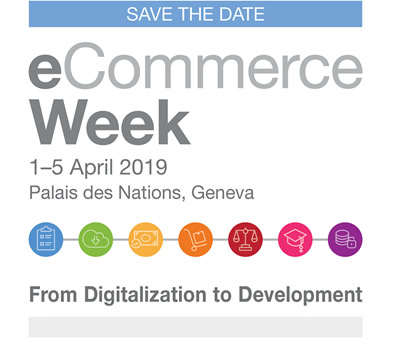Ministerial roundtable on trade, data, & digitalisation
2 Apr 2019 10:00h - 13:00h
Event report
[Read more session reports and live updates from the UNCTAD E-commerce Week]
Mr Alexander Mora (Chairman LATAM, EVICERTIA) served as moderator for the session which addressed how our newly data-driven economy promotes new opportunities, wealth, and addresses sustainable development goals (SDGs). Participants of the roundtable raised concerns regarding data, such as privacy, security, market concentration, and international regulations.
Ms Isabelle Durant (Deputy Secretary General, UNCTAD), Chair of the event, emphasised how data is central to the digital economy, and that developing countries need more assistance in transforming raw data into valuable information so they are not left behind. She spoke about the progress in Africa in online shopping, and addressed developing countries by saying ‘count on us to continue to work with you’.
Ms Amani Abou-Zeid (Commissioner for Infrastructure and Energy, African Union Commission) addressed the growing need for the continent of Africa to create a strategy with different stakeholders that will allow them to participate more fully in the digital economy. They are making progress by creating a central African database to assist the private and public sectors.
Ms Solo Andry Lantosoa Rakotomalala (Minister of Industry, Trade and Crafts, Madagascar) spoke about the challenges of developing countries to properly use data despite the great opportunities that lie in obtaining skills. They still need to increase banking rights as mobile banking continues to grow, but first require financial inclusion.
Mr Pedro Mancuello (Vice Minister of Trade, Paraguay) highlighted the shift from computer to mobile phones in Paraguay. With this change, there is a need for more investment in the cybersecurity infrastructure. He addressed the growing need for a legal framework, and Paraguay’s progress in the field of digital signatures.
Mr Joãozinho Mendes (Commissaire, West African Economic and Monetary Union) explained the rapid expansion of Internet usage and that ‘digital platforms are becoming the new marketplace’. However, it is difficult for many producers to become digitally visible in developing countries, and they need help with data to create marketing strategies.
Ms Helena Leurent (Director General, Consumers International) said she looks forward to the learning journey since digital commerce includes all sectors. Opportunities include better, smarter, and more efficient products at the hands of data. There are still challenges including the fear of personal data being used for individualised prices and blocked access to products. On an international level, solutions for access, inclusion, protection, and transparency are easier said than done.
Mr Joshua Meltzer (Senior Fellow, Brookings) talked about data localisation and government regulation of content that consumers are allowed to see. He said data localisation makes hacking more probable. Digitalisation will assist global value chains for small and medium-sized enterprises (SMEs) and women. He concluded that not all roads lead to regulation and that there is a need for balance.
Ms Xiaofei Yao (Founder and CEO, Rogrand E-commerce) said that developing and developed countries need to be reclassified since China used to be an example of a developing country, but is now improving tremendously in both skill and speed. To create prosperity, multilateral trade and data utilisation is needed.
Ms Deborah Elms (Founder and Executive Director, Asian Trade Centre) said small companies care less about big data and whether they sell it to a company or individual. Instead, they just want to sell their product and require better trade facilitation.
Mr Fen Hampson (Director, Global Security & Politics, Centre for International Governance Innovation) spoke about the security problems SMEs in Canada are facing because of cyber-attacks. He says that companies with good safety infrastructure will win, and all others will be penalised for their lack of trust, and therefore in sales.
Mr Pradeep Singh Mehta (Secretary General, Consumer Unity and Trust Society International) emphasised the need for inclusive development. He said we should use digital platforms to support global value chains, especially with SMEs, start-ups, and women. He also noted that equitable access to data is needed.
Mr Brian Wong (Vice President, Alibaba Group) highlighted how the private and public sectors should work together to close the digital gap. He spoke of Alibaba’s success in bringing jobs to Asian villages. He stressed that we need a more inclusive economy that promotes education, empowers, and provides the proper space for experimentation.
Ms Maria Ceccarelli (Chief, Trade Facilitation Section, ECTD/UNECE) emphasised the need for international rules. The UN Economic Commission for Europe (UNECE) looks forward to staying at the forefront of new technologies with both developing and developed countries.
By Natalie Meyer
Related topics
Related event

eCommerce Week 2019: From Digitalization to Development
1 Apr 2019 15:45h - 5 Apr 2019 15:45h
Geneva, Switzerland
